Jazz CD Survey: Snapshots and Concepts, Summer 2018
A baker’s dozen of recordings worth hearing . . . maybe even owning.
By Steve Elman
[Disclosure: I purchased ten of the releases discussed here. I received promotional copies of Compassion, Strykin’ Ahead and Dedication, and heard Both Directions at Once via Spotify.]
Musicians issue recordings for two principal reasons: to offer snapshots of their work at a particular moment in time, and/or to memorialize long-form artistic concepts that seem worthwhile. Ironically, the listener cannot form a perception of the value of any particular project without the perspective of time. How does this year’s snapshot compare to those captured in previous years? How does this artist’s concept compare with similar ones by other artists?
Furthermore, no judgment is possible at all without sufficient time to hear and consider. At the same time modern media provide us with an unprecedented deluge of creativity in every form, the news nibbles away at the safe spaces inside us, stealing attention from those very things that could provide peace of soul. And even without consideration of this hour’s headlines, who has time to see all the worthy films and television shows, get to all the worthy stage presentations, hear all the worthy music?
Consider this post to be a few small strokes against the current, thanks to the Independence Day holiday falling on a Wednesday. That unusual week of downtime gave me the chance to hack away at the pile of CDs I’ve bought and received, to hear the one new release which absolutely demanded attention, and to think about the impact of it all. So here’s a baker’s dozen of recordings worth hearing . . . maybe even owning. There’s nothing calculated about the selection, but I hope it offers a broad-stroke view of where jazz has been and where it is now.
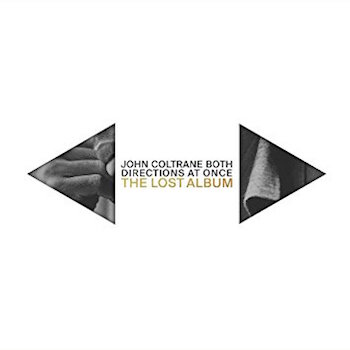
Pride of place belongs to the new release that has gotten the most general press in the past month: John Coltrane’s Both Directions at Once – The Lost Album. Several Arts Fuse writers have discussed it, with Michael Ullman giving us a full and considered review. As did Steve Feeney. I will try to avoid redundancy here by asking and answering the prime questions first. Is it worth owning? Yes, especially by anyone who loves the music made in the 1960s by Coltrane’s remarkable quartet of giants – pianist McCoy Tyner, bassist Jimmy Garrison, and drummer Elvin Jones. Elvin’s work here in particular is a very valuable addition to the musical record. But is it a necessary buy? No. This period in Coltrane’s career is represented by an embarrassment of riches, and, as Ullman notes, there is a tentative feel to the whole affair.
If the session had appeared contemporaneously, it would have fallen among three brilliant albums –– Duke Ellington and John Coltrane, recorded in September 1962; Ballads, recorded in November 1962; and John Coltrane and Johnny Hartman, recorded on March 7, 1963, the day after Both Directions at Once. All three of these LPs were developed by Impulse producer Bob Thiele to broaden Coltrane’s appeal, and each one is considered almost indispensable. To cap this trio, the LP titled Live at Birdland was recorded seven months later, in October 1963, and that session is a definitive statement of the quartet’s power in performance. So it’s no wonder that Both Directions at Once was set aside. The date may have been a test-drive for several LP ideas that didn’t bear ultimate fruit.
The four takes of “Impressions” are probably exercises in focus; Coltrane played the tune on almost every live date in this period, and more than thirty versions of it from the early 1960s have come out in various forms. “Untitled Original 11383” and “Slow Blues” are in the spirit of blues-oriented tunes recorded for Atlantic in October 1960 that were issued in Coltrane Plays the Blues, and Thiele may have been contemplating an update of that idea for Impulse. And Eden Ahbez’s “Nature Boy” and Kurt Weill’s “Vilia” are part of a long line of beautiful Coltrane interpretations of popular-song forms, although this version of “Nature Boy” is just a truncated sketch to be revisited definitively later on.
The two pieces of the most interest to me are “Untitled Original 11386” and “One Up, One Down,” modal tunes with outstanding contributions from Tyner and Jones. The theme in the second take of “11386” has a subtle harmonic change from the first, bringing out a Native American feel, and suggesting that this tune might have been intended as part of Coltrane’s non-Western series, a successor to “Africa,” “India,” and “Afro Blue,” and a precursor of “Brazilia.” “One Up, One Down” is different from the later Coltrane composition “One Down, One Up,” and spotlights breaks of varying lengths from Jones, who is breathtaking on every one.
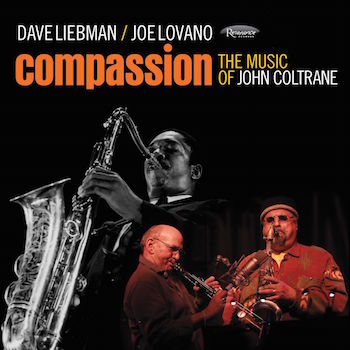
Coltrane’s legacy is inexhaustible, and a release from last year shows just how vigorous it still is. Dave Liebman and Joe Lovano: Compassion – The Music of John Coltrane was recorded for the BBC in 2007, but the decade between recording and release doesn’t show in the music. Liebman and Lovano, two of the world’s best saxophonists, chose seven Coltrane compositions for a beautifully balanced program that touches every phase of St. John’s career. They’re impeccably interpreted by the two leaders, with stellar support from pianist Phil Markowitz, bassist Ron McClure, and drummer Billy Hart. As a concept, this could hardly be better-conceived, since the leaders restrict the scope of each performance and distill their thinking to what is essential – there are no twenty-minute marathon solos here. Each of the other players has something valuable to offer as well, and all five contribute liner notes, through which I learned that Billy Hart is the only one of them to have heard Coltrane play in person – another testament to the continuing importance of Coltrane’s recorded work.
I’ve been disappointed that in the wake of Horace Silver’s death in June 2014 there haven’t been more retrospectives or previously-unissued sets, but here are three of note:
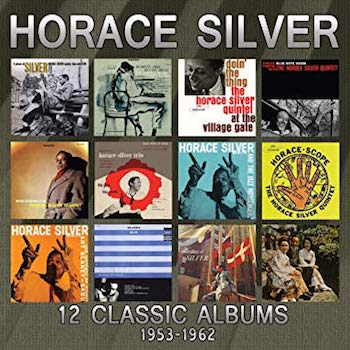
For anyone who doesn’t yet appreciate Silver’s greatness, a bargain of a lifetime (six CDS, selling for $15 via Amazon, $17 via CD Universe, $19 via Barnes & Noble) has come out on Enlightenment, a European label. Here are a dozen LPs recorded in a white-hot decade of the pianist’s career (Horace Silver: 12 Classic Albums, 1953 – 1962). The flow of inspiration is astonishing, and the arrangements of popular songs hold up just as well as Silver’s beautiful originals. Nearly every track is well worth hearing, and I heard only one over the six CDs that doesn’t deserve anthologizing – “Virgo,” from 1956, an original that is played so fast that Donald Byrd and Hank Mobley can’t put their ideas together effectively.
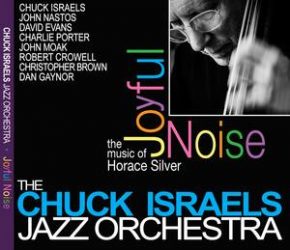
The same period of Silver’s career is honored in Chuck Israels Jazz Orchestra: Joyful Noise – The Music of Horace Silver. Bassist Israels has arranged eleven of the tunes hearable on “12 Classic Albums” for an octet of players from the Pacific Northwest. He’s chosen well, avoiding the most familiar items and bringing new life to tunes like “Cool Eyes” and “Moonrays.” The other musicians on the date may not be A-list players, but they handle the charts and solos well. Israels also provides some of the most useful and beautifully-written liner notes I’ve read in a long time.

I had high hopes for another European release, Horace Silver: Quintet, June 1977, the first appearance on CD of a live recording of Silver’s working group of the time – trumpeter Tom Harrell, saxophonist Larry Schneider, bassist Chip Jackson, and San Francisco drummer Eddie Gladden. Everyone plays well, but the dynamic precision of Silver’s classic quintet records isn’t quite there. However, it’s notable for instrumental versions of two tunes previously available only in regrettable vocal arrangements – “Out of the Night Came You” and “Incentive” – and an interesting re-arrangement of Silver’s classic “Song for My Father” that gives each soloist a double solo – part in medium tempo, and part accelerated for extra fire.
But we don’t have to live in the past to find great recorded music. Three of the most innovative of the twenty-first century’s musicians produced recordings last year that are rich with present satisfactions and future promise, and a new all-star band gave us a great example of collective empathy:
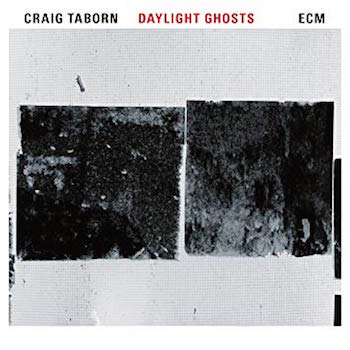
Craig Taborn: Daylight Ghosts, pianist-composer Taborn’s most recent CD on ECM, is a snapshot, but one that provides a comprehensive picture of the artist’s mature talent. Anyone curious about him from the press he’s received should give this a both-ears listen. It is not music that gives everything at first, but great art should challenge us, and when you listen to “Daylight Ghosts,” you can almost feel your synapses snapping. Written material and improvisations are carefully interwoven in each tune, and there is enough repetition of melodic and rhythmic kernels to give a first-time listener a sense of where each composition is going. “New Glory,” “Subtle Living Equations,” and Roscoe Mitchell’s “Jamaica Farewell” would be very good places to start, but you’ll want to hear the whole CD several times to savor it properly. Taborn’s group – reedplayer Chris Speed, bassist Chris Lightcap, and drummer Dave King – fit into the music expertly.
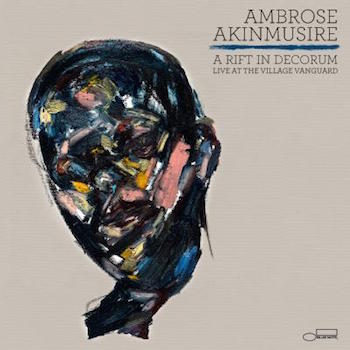
Ambrose Akinmusire: A Rift in Decorum – Live at the Village Vanguard showcases another gifted composer-improviser, but one of a very different stripe. Taborn’s compositions on Daylight Ghosts all seem to be coming from the same esthetic well, but Akinmusire’s pieces on this 2-CD set are multi-flavored, and each has a distinctive taste. As a writer, he is by turns long-breathed (“Purple”), prayerful (“First Page”), beboppish (“Trumpet Sketch”), jagged (“Brooklyn”), and affectionate (“Taymoor’s World”). As a trumpet soloist, he shows off a profoundly vocal quality in the tradition that extends back to Lester Bowie, Kenny Dorham and Ray Nance, and an impressively expressive imagination. This CD also gave me my first exposure to pianist Sam Harris, and his incorporation of Cecil-Taylorish effects, along with tastes of Andrew Hill and Jaki Byard, mark him as a Player to Watch. Bassist Harish Raghavan and drummer Justin Brown may not be as original as Akinmusire and Harris, but they are very good and very supportive, and that should not be misinterpreted as faint praise.
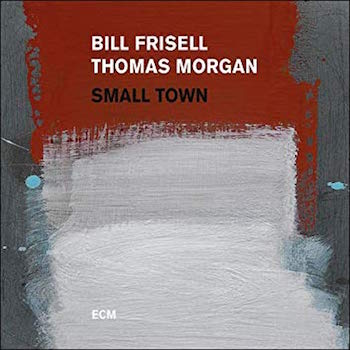
I enjoy going along on guitarist Bill Frisell’s adventures, whether he’s exploring Americana or surf music or whatever other genre strikes his fancy, but I confess I prefer to hear him in performance, with no particular musical agenda. That’s why I particularly appreciated Bill Frisell & Thomas Morgan: Small Town, recorded live at the Village Vanguard just about a year after Akinmusire’s set. The overall mood is contemplative and relaxed, but that’s the perfect frame of mind in which to appreciate Frisell’s absolute mastery. He never makes a show of it, but he knows how to create magical effects with echoplex, and you can appreciate how he does it live on Paul Motian’s “It Should Have Happened a Long Time Ago.” He introduces a figure that includes a cascade of harmonics, and then repeats it electronically and duets with it. Some of his touchstones are here – Americana with a bluegrass bent (“Wildwood Flower”), New Orleans (Fats Domino’s “What a Party”) and film music (John Barry’s theme from “Goldfinger”) – but I find the most satisfying music on the three tribute compositions – the Motian tune mentioned above, “ Lee Konitz’s “Subconscious-Lee,” and Frisell’s “Song for Andrew No. 1,” probably written for drummer Andrew Cyrille. I don’t mean to leave Thomas Morgan in Frisell’s shadow; his lovely tone and excellent pitch make him an ideal partner here.
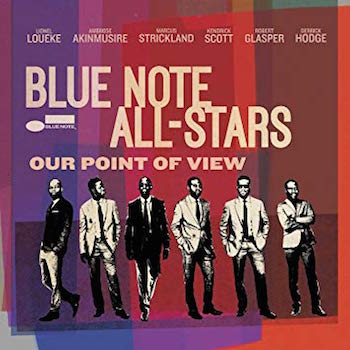
Ambrose Akinmusire appears again in a more straight-ahead setting as part of the Blue Note All-Stars in Our Point of View. This is not the same band as the ’90s ensemble that included Greg Osby and Bill Stewart, and it’s not like any of the Blue Note homage bands like Herbie Hancock’s V. S. O. P. It compares instead to the SF Jazz Collective – a limited-edition coming-together of talented player-composers. It’s an army of generals, and Akinmusire is one of the strongest contributors. His feature, “Henya,” shows an intimacy that doesn’t appear often on A Rift in Decorum – another reason never to make definitive artistic judgments on the basis of one release. Keyboardist Robert Glasper, who’s known for cross-genre mixups on his own releases, also plays it straighter here. Lionel Loueke sings on a couple of tracks, and contributes one of the most appealing tunes, “Freedom Dance,” but his guitar playing is why you’ll want to listen to him; on Wayne Shorter’s “Witch Hunt,” his solo covers a lot of territory, changing timbres dramatically and ranging from abstract stabs to blues licks. Saxophonist Marcus Strickland particularly shines on his tune “Meanings,” but his playing is strong throughout. And as with the SF Jazz Collective, the rhythm section – bassist Derrick Hodge and drummer Kendrick Scott – are equal partners in the music. The two-disc set includes guest appearances on one tune by Herbie Hancock and Wayne Shorter, and is framed by two memorial pieces to the late Bruce Lundvall (the executive who revived the Blue Note label in the ’80s and ’90s). The first of those includes a mushmouthed excerpt of a Lundvall speech (fortunately transcribed in the liner notes) with a kind of thumb-in-your-eye manifesto to critics who kept bothering him with questions like, “Is jazz dying?” This could have been the idea of producer Don Was, who is now standing in Lundvall’s shoes as head of the label, and hopes to be just as groundbreaking in his leadership. (For a sense of what Was wants to accomplish, see Max Bell’s interview with him on the Forbes website.
Two of our best jazz singers have also given us recent CDs, each one successfully focused on pop repertoire:
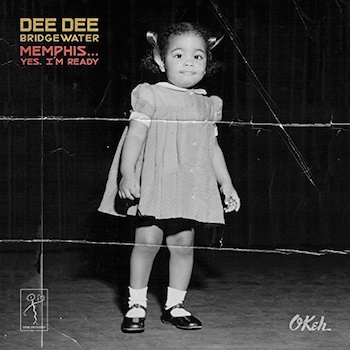
Dee Dee Bridgewater is the greatest living jazz vocalist, but she is no diva. Her liner notes for Memphis . . . Yes, I’m Ready are almost apologetic (without setting ego aside completely): “Yes, I’m a jazz singer, a 2017 NEA Jazz Master, but this is something I’ve always dreamed of doing.” Fortunately, there’s nothing tentative or undecided about the music, twelve well-chosen tunes associated with classic R&B. They were recorded in the late Willie Mitchell’s studio in Memphis, where Reverend Al Green created so many memorable hits. “I Can’t Stand the Rain” is Bridgewater’s nod to Green, although, like each of the other tunes, it is thoughtfully re-interpreted. What comes through forcefully throughout the CD is the contrast between the way a jazz singer approaches a lyric and the way most pop singers work. A great jazz singer thinks deeply about the words and invests them with personal meaning; too many singers in popular music skate along the top of the words and never delve down. The most striking example here is “Don’t Be Cruel,” where Bridgewater sets the jump-feel of Elvis’s original aside and puts near-heartbreak into the words. Other standouts: an Al Green-like reworking of “The Thrill Is Gone,” which almost erases the memory of B. B. King’s classic; “I Can’t Get Next to You,” a stripped-down version of The Temptations’ hit that reveals its spiritual connection to unrequited love songs stretching back at least to Bunny Berigan’s “I Can’t Get Started”; and “Why (Am I Treated So Bad),” a bow to the Staple Singers and Cannonball Adderley that never sacrifices its Bridgewater-ness. The excellent arrangements are credited to Kirk Whalum and John Stoddart, but Bridgewater surely had more than a superficial impact on them.
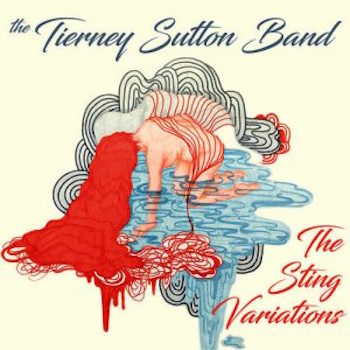
In The Sting Variations, Tierney Sutton strikes again as one of the best song interpreters in all of music. Like Bridgewater, she thinks hard about the words and makes every line of a lyric count. Here she unerringly tempers the pretentiousness that so often mars Gordon Sumner’s interpretations of his own songs, shades and stretches where Sting reads mechanically, and puts real jazz into music that just hints at a cross-genre influence. Prime example: “Consider Me Gone,” which Sting presented as an explicitly jazz-inflected tune. He sang it offhandedly, with more or less the same emphasis in each line, but Sutton finds a more expressive way to shape the words, giving the tune real gravitas. Conversely, her read of “Every Breath You Take” removes the sinister weirdness of the original and replaces it with a sunny devotion. In between the two, her relatively straight reading of “Fields of Gold” is so pure and heartfelt that this tune, lovely enough in Sting’s version, can bring you to tears here. Sutton is admirably careful to credit her releases to the “Tierney Sutton Band” rather than just to herself as leader, and Christian Jacob once again fills the thankless role of her “piano accompanist” with verve. Special notice also to Trey Henry, who arranged ten of the tunes, produced the CD, and played bass on two tracks. It may have been his idea to interpolate Luiz Bonfa’s “Gentle Rain” into Sting’s “Fragile,” and to turn “Driven to Tears” into a medley with Miles Davis’s “So What.” Both concepts are realized very satisfyingly, although the duplication of Bill Evans’s misterioso piano introduction to “So What” and the use of George Russell’s harmonies under Sutton’s wordless singing of Miles’s solo from the same tune are unfortunately uncredited.
Lastly, I was glad to have new CDs from two artists who have had a long working relationship. They were both recorded in the same studio in Paramus, New Jersey, about a year apart:
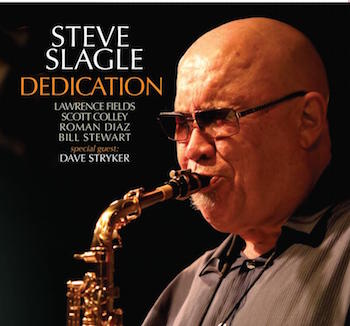
The more recent of the two, Steve Slagle: Dedication, is one of the best outings yet from a journeyman saxophonist I’ve admired since he was a student player in the Bean in the 1970s. His admiration for fellow altoists Cannonball Adderley and Jackie McLean is obvious in his work, but he also acknowledges the influences of tenor players Sonny Rollins and Wayne Shorter. In fact, in this CD he dedicates each tune to a different important influence in his life, including McLean, Rollins, and Shorter, and stretching the idea to include “the great spirit of music from Brazil,” “swing and all its meaning,” and his child Sophia. Fortunately, the concept never gets in the way of the execution of a solid program. Example: Slagle glances at the repetitive figures of “East Broadway Run Down” and the calypso rhythm of “St. Thomas” in “Sun Song, “ the tune dedicated to Rollins, but he is completely himself in his strong solo. Another: “Sofi,” the tune for his 7-year-old daughter, is in 7/4, and includes a smart quote from Joe Zawinul’s “74 Miles Away,” a tune in the same time signature, but you don’t need to have a “hip card,” as Slagle says in the notes, to know that the performance is a keeper. Slagle also knows how to assemble a band of simpatico players (Lawrence Fields, piano; Scott Colley, bass; Bill Stewart, drums; and Roman Diaz, percussion), and brings in guitarist Dave Stryker as guest artist. Stryker has worked with Slagle off and on for a decade or so, and their rapport is obvious, particularly on “Niner.”
 I first got to know Stryker’s playing through Slagle’s records, and the guitarist’s recent CD, Dave Stryker: Strykin’ Ahead, gave me another name for my hear list: organist Jared Gold. Gold is one of a precious few organists who isn’t following in the wake of Jimmy Smith; he chooses the road usually not taken, the path blazed by Khalid Yasin, aka Larry Young. Even Gold’s comping and bass-pedal work are creative and original. To provide even more color, Stryker invited vibraphonist Steve Nelson to join the date, and the result is a delightful and unusual blend – guitar, vibes, organ, and drums (played by McClenty Hunter). For me the standouts are Wayne Shorter’s “Footprints,” re-set in 5/4 time; Clifford Brown’s “Joy Spring,” augmented with a new introduction and some substitute changes; and a modalized arrangement of Charlie Parker’s “Donna Lee.” Not to mention some tasty originals, especially the fundamentally solid “Blues Down Deep.”
I first got to know Stryker’s playing through Slagle’s records, and the guitarist’s recent CD, Dave Stryker: Strykin’ Ahead, gave me another name for my hear list: organist Jared Gold. Gold is one of a precious few organists who isn’t following in the wake of Jimmy Smith; he chooses the road usually not taken, the path blazed by Khalid Yasin, aka Larry Young. Even Gold’s comping and bass-pedal work are creative and original. To provide even more color, Stryker invited vibraphonist Steve Nelson to join the date, and the result is a delightful and unusual blend – guitar, vibes, organ, and drums (played by McClenty Hunter). For me the standouts are Wayne Shorter’s “Footprints,” re-set in 5/4 time; Clifford Brown’s “Joy Spring,” augmented with a new introduction and some substitute changes; and a modalized arrangement of Charlie Parker’s “Donna Lee.” Not to mention some tasty originals, especially the fundamentally solid “Blues Down Deep.”
What fun it was . . . first, to hear so many outstanding artists playing so well, and second, to rediscover the pleasures of first listening. That first listen can never be repeated, so it deserves to be mentioned as an experience unto itself. In this particular form of music, where cooperation is essential to success and every player has a vital role, that first listen provides any sensitive appreciator with a reminder of the wonders people can work when they give honestly, sincerely, selflessly.
And in a time when honesty, sincerity, and selflessness seem in very short supply, it’s vital to be taught that lesson again.
More:
Discographical details about the CD releases reviewed above, in chronological order by date of recording:
Horace Silver: 12 Classic Albums, 1953 – 1962 [Reissue of: New Faces New Sounds – Introducing the Horace Silver Trio (Blue Note, 1952); Horace Silver Trio and Spotlight on Drums (Blue Note, 1955); Horace Silver and the Jazz Messengers (Blue Note, 1956); Silver’s Blue (Epic, 1956); 6 Pieces of Silver (Blue Note, 1956); The Stylings of Silver (Blue Note, 1957); Further Explorations (Blue Note, 1958); Finger Poppin’ (Blue Note, 1959); Blowin’ the Blues Away (Blue Note, 1959); Horace-Scope (Blue Note, 1960); Doin’ the Thing (Blue Note, 1961); The Tokyo Blues (Blue Note, 1962)] (Enlightenment, 2014; rec. rec. October 1952 – July 1962, NYC and Englewood Cliffs, NJ)
John Coltrane: Both Directions at Once – The Lost Album (Impulse, 2018; rec. March 6. 1963, Englewood Cliffs, NJ), w. Coltrane, ts/ss; McCoy Tyner, p; Jimmy Garrison, b; Elvin Jones, dm
Horace Silver: Quintet, June 1977, w. Silver, p; Tom Harrell, tp; Larry Schneider, ts; Chip Jackson, b/e-b; Eddie Gladden, dm (Promising Music / Livelove Series, 2014; rec. June 28, 1977, Bremen, Germany)
Dave Liebman and Joe Lovano: Compassion – The Music of John Coltrane, w. Liebman, ts/recorder/ C-fl; Lovano, ts/alto-cl/Scottish fl/ “autochrome” (two ss lashed together); Phil Markowitz, p; Ron McClure, b; Billy Hart, dm (Renaissance, 2017; rec. June 22, 2007, NYC)
Chuck Israels Jazz Orchestra: Joyful Noise – The Music of Horace Silver, w. Israels, b/arr; Charlie Potter, tp; John Moak, tb; John Nastos, as/ts; David Evans, ts/fl; Robert Crowell, bari/as/fl/bcl; Dan Gaynor, p; Christopher Brown, dm (Soulpatch, 2014; rec. September 2014, Portland OR)
Ambrose Akinmusire: A Rift in Decorum – Live at the Village Vanguard, w. Akinmusire, tp; Sam Harris, p; Harish Raghavan, b; Justin Brown, dm (Blue Note, 2017; rec. February 2016, NYC)
Craig Taborn: Daylight Ghosts, w. Taborn, p; Chris Speed, ts/cl; Chris Lightcap, b/ e-b; Dave King, dm/ per (ECM, 2017; rec. May 2016, NYC)
Dave Stryker: Strykin’ Ahead, w. Stryker, g; Steve Nelson, vib; Jared Gold, org; McClenty Hunter, dm (Strikezone, 2017; rec. June 2016, Paramus NJ)
Tierney Sutton Band [Sutton, vo; Christian Jacob, p; Kevin Axt, b; Rya Brinker, dm/per], The Sting Variations, w. Trey Henry, b/e-b/arr (BFM Jazz, 2016; rec. June 2016, Woodland Hills CA)
Dee Dee Bridgewater: Memphis . . . Yes, I’m Ready, w. Bridgewater, vo; Kirk Whalum, ts/bari; John Stoddart, kb; Charles Hodges, org; Jackie Clark, b; Garry Goin, g; James “Bishop” Sexton, dm; arranged by Kirk Whalum and John Stoddart (Okeh, 2017; rec. September and December 2016, Memphis TN)
Blue Note All Stars [Ambrose Akinmusire, tp; Marcus Strickland, ts; Lionel Loueke, g/vo; Robert Glasper, p/e-p, Derrick Hodge, b/e-b; Kendrick Scott, dm] – Our Point of View, with Wayne Shorter, ss; Herbie Hancock, p (Blue Note / Capitol, 2017; rec. late 2016, Hollywood CA)
Bill Frisell: Small Town, w. Frisell, g; Thomas Morgan, b (ECM, 2017; rec. March 2017, Village Vanguard, NYC)
Steve Slagle: Dedication, w. Slagle as/ss/fl; Lawrence Fields, p; Dave Stryker, g; Scott Colley, b Bill Stewart, dm; Roman Diaz, per (Panorama, 2017; rec. July 2017, Paramus NJ)
Steve Elman’s four decades (and counting) in New England public radio have included ten years as a jazz host in the 1970s, five years as a classical host in the 1980s, a short stint as senior producer of an arts magazine, thirteen years as assistant general manager of WBUR, and currently, on-call status as fill-in classical host on 99.5 WCRB since 2011. He was jazz and popular music editor of The Schwann Record and Tape Guides from 1973 to 1978 and wrote free-lance music and travel pieces for The Boston Globe and The Boston Phoenix from 1988 through 1991.
Tagged: 12 Classic Albums, 1953 - 1962, A Rift in Decorum, Ambrose Akinmusire, Bill-Frisell, Blue Note All Stars, Both Directions at Once: The Lost Album, Chuck Israels Jazz Orchestra, Compassion - The Music of John Coltrane, Craig Taborn, Dave Liebman, Dave Stryker, Daylight Ghosts, Dedication, Dee Dee Bridgewater, Horace Silver, Horace Silver: Quintet June 1977, I'm Ready, Joe Lovano, John-Coltrane, Joyful Noise - The Music of Horace Silver, Live at the Village Vanguard, Memphis ... Yes, Our Point of View, Small Town, Steve Slagle, Strykin’ Ahead, The Sting Variations

